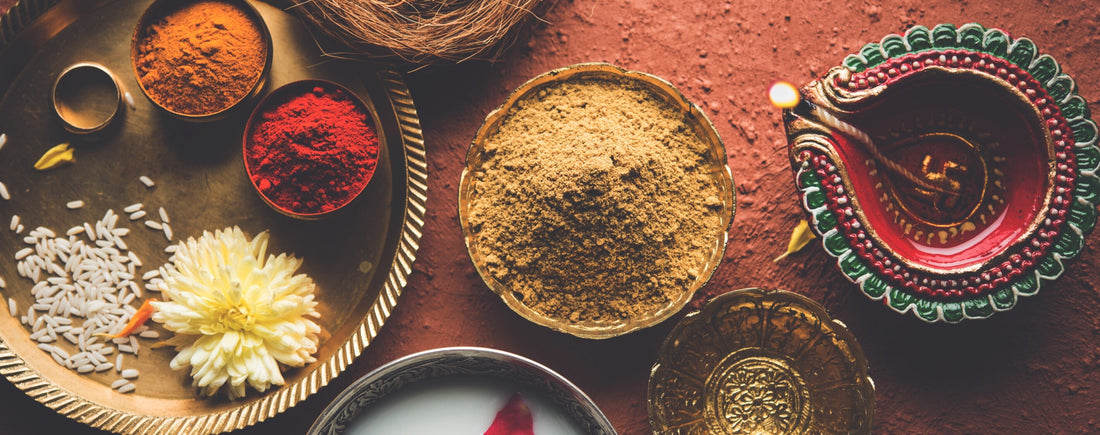From an Ayurvedic perspective, the phrase "you are what you eat" takes on a much more significant meaning. Beyond the physical impact of your diet, the food you eat can significantly alter your emotional state. Why do you crave sweets when you're missing a loved one? The answer can be found when we examine the emotional qualities of the six tastes of Ayurveda.
The Ayurvedic tastes include; sweet, salty, sour, pungent, astringent, and bitter. It's well-understood that each of these tastes has a correlating impact on the three doshas, allowing you to use food to balance your constitution.
What many people overlook, however, is the impact that the six tastes have on your emotional state.
When you're feeling out of balance emotionally (whether it be anger, frustration, sadness, and so on), you'll crave specific tastes related to that emotion in an effort to bring yourself back into balance. Unfortunately, when it comes to the emotional body, food is not the most effective way to attain homeostasis. In fact, the taste that you crave is much more likely to drive imbalance than to create more balance.
Instead, lifestyle techniques such as abhyanga, yoga, breathwork, and other mind-body practices provide a much more efficient means of bringing yourself back home.
Among the six tastes, the sweet taste is invariably the one that people crave the most. While research shows that your mind and body can become physically addicted to sweets, the reinforcing drive often comes from a lack of love in your life.
Positive emotions associated with the sweet taste include love, joy, compassion, satisfaction, happiness, clarity, awareness, peace, and calm.
However, when used in excess, sweetness may produce feelings such as greed, possessiveness, lust, attachment, materialism, and cravings.
You can likely relate to the feeling of over-consuming sweets where the joy and satisfaction turn into feelings of craving and attachment – in other words; you can't have just one cookie.
Instead of turning to sweets as your primary source of comfort in tough times, a more effective way to find balance would be a gentle oil massage (abhyanga). Both touch and warmth can stimulate the nerves in your skin, which sends a message to your brain to release the chemical oxytocin.
Oxytocin, also known as the love hormone, provides a sense of well-being and has an anti-stress impact on your nervous system. By giving yourself a warm oil massage, you're directly nourishing your body and mind while enhancing feelings of love and compassion.
The sweet taste increases Kapha in your constitution, and balances Vata and Pitta. Therefore, if you’re experiencing a Kapha imbalance it’s best to use the sweet taste in moderation.
Sprinkling salt on your meal livens it up and enhances the other flavors present in your food. In much the same way, when you're craving salt, it may be that you're craving a little more vibrance and "flavor" in your life.
Positive emotional states associated with the salty taste include courage, zest, confidence, and enthusiasm. On the other hand, salt can make you feel greedy, irritable, possessive, overambitious, and addicted when consumed in excess.
As you can see, sweet and salty share several traits associated with addiction and craving; this is why these two tastes tend to be the most frequently craved and overused of the six.
When you need a little more spice in your life, try pushing your comfort zone instead of piling on the salt. Maybe attend a new class you've been thinking about, or get started on that passion project; you can even leverage the other five tastes by switching out salt for a variety of different herbs to keep things interesting.
The salty taste increases both Pitta and Kapha, and balances Vata. Therefore, if you’re experiencing a Vata imbalance adding more salt to your meals may be beneficial, but be careful of your salt intake if your constitution is already highly Pitta or Kapha.
Sour foods like citrus fruits and vinegar can help to wake up your brain, sharpen your senses, and enhance your discrimination. Notice how your mouth puckers when you consume sour foods? This is the action of the sour taste – to ground and draw inward. Positive emotional states associated with sour include appreciation, understanding, discrimination, groundedness, and certainty.
When you're craving sour, you may be looking for some clarity or direction, which is not uncommon when you feel overwhelmed in life. While snacking on an orange is a harmless way to keep your brain power going, too much sour may cause your mind to close in, creating feelings of envy, jealousy, selfishness, anger, hatred, and withholding.
Instead, try doing the breath of fire when you need a little more direction or clarity. This breathing exercise not only calms your nervous system, but it awakens your mind and stimulates your solar plexus chakra (power center).
Much like the salty taste, the sour taste increases Pitta and Kapha while balancing Vata. If you already have a Pitta or Kapha imbalance, only enjoy sour foods in moderation.
Pungent foods will "fire you up." When consumed in balance, pungency adds a little passion and excitement to your life, like throwing some hot sauce on your dinner to give it an extra kick. Positive emotional states associated with the pungent taste include clarity, passion, enthusiasm, curiosity, vitality, vigor, and expansiveness.
However, a little too much heat can get dicey very quickly – like throwing gasoline on a flame. Not surprisingly, the negative emotional states associated with the pungent taste are very much in line with excess Pitta (both very fiery). These include anger, envy, irritability, competitiveness, and impatience.
When you need to add some fire to your life and want a hit of energy, try doing a vinyasa yoga flow. Any poses that activate your pelvic floor will ignite passion in your life as this area is correlated with your second chakra and awakens the kundalini circuit.
You may also want to engage in empowering poses that activate your largest muscle groups, such as chair pose and any of the warrior poses.
The pungent taste is the most heating of all six, so for those with high levels of Pitta in their constitution it’s wise to use pungent very moderately. Pungent may also aggravate Vata, so be careful with pungent foods and spices if you have a Vata imbalance. For those with high levels of Kapha, however, the pungent flavor can help balance the excessive Kapha in your constitution.
The astringent flavor not only causes contraction of the mind, but it also provides a sense of groundedness. That's why you may feel a bit more stable, organized, collected, or grounded when sipping a cup of tea or a glass of red wine. You could say that the astringent taste gathers your mind and brings you home.
Of course, too much of a good thing can turn sideways. When consumed in excess, that mental contraction and groundedness can turn into fear, anxiety, sadness, rigidity, obsession, resentment, and emotional heaviness.
Instead of reaching for a bottle of wine, try mindful breathing when you feel like you need to come home to yourself and gather your thoughts. This simple meditation technique asks you to pay attention to your breath, following it closely with each inhale and exhale, noticing when your mind wanders, and then gently returning it back to the breath. Research shows that just ten minutes of mindfulness meditation each day may decrease feelings of anxiety[*].
The astringent flavor balances Kapha and Pitta, and may aggravate Vata. If you have a Vata imbalance, it’s wise to use astringent foods and beverages in moderation. If you’re experiencing excess Kapha or Pitta in your constitution, adding astringency to your diet will help balance these doshas.
If you're a coffee drinker, then you know exactly what it's like to crave the bitter taste. Bitter provides a sense of mental spaciousness, introspection, self-awareness, clarity, and healthy detachment. This open-minded energy allows you to be more creative and think outside the box.
When used in excess, however, the bitter flavor can make you feel "spaced out," nervous, isolated, cynical, dissatisfied, agitated, and filled with grief. In other words, it might make you feel a little "bitter" about things.
When you're looking for a way to open your mind and experience more self-awareness, try expressive writing. At first, it may feel like you're just writing down nonsense, but you'll soon find that your subconscious has quite a bit to say, and once it's down on paper, it will leave a lot more spaciousness in your mind for more productive and creative thinking.
Due to the airiness of bitter, this taste can create imbalances for the Vata dosha even more so than astringency. Therefore, if you’re experiencing a Vata imbalance try to avoid excessive bitter in your diet. On the other hand, bitter can balance Kapha and Pitta making bitter foods an excellent addition to a Pitta or Kapha balancing diet.
While certain foods and drinks have the capacity to create imbalance in your mind and body, the key to balance is not to avoid food. Instead, aim to include all six tastes in the form of whole, real food. Ayurvedic nutrition isn’t about perfection, it’s about moderation, mindfulness, and enjoyment.
Step into the power of the present moment with Meditations for a Healthy Mind, a three-part series with Roger Gabriel, available now in the Chopra App.
The Emotional Qualities Of The Six Tastes
The Ayurvedic tastes include; sweet, salty, sour, pungent, astringent, and bitter. It's well-understood that each of these tastes has a correlating impact on the three doshas, allowing you to use food to balance your constitution.
What many people overlook, however, is the impact that the six tastes have on your emotional state.
When you're feeling out of balance emotionally (whether it be anger, frustration, sadness, and so on), you'll crave specific tastes related to that emotion in an effort to bring yourself back into balance. Unfortunately, when it comes to the emotional body, food is not the most effective way to attain homeostasis. In fact, the taste that you crave is much more likely to drive imbalance than to create more balance.
Instead, lifestyle techniques such as abhyanga, yoga, breathwork, and other mind-body practices provide a much more efficient means of bringing yourself back home.
Sweet
Among the six tastes, the sweet taste is invariably the one that people crave the most. While research shows that your mind and body can become physically addicted to sweets, the reinforcing drive often comes from a lack of love in your life.
Positive emotions associated with the sweet taste include love, joy, compassion, satisfaction, happiness, clarity, awareness, peace, and calm.
However, when used in excess, sweetness may produce feelings such as greed, possessiveness, lust, attachment, materialism, and cravings.
You can likely relate to the feeling of over-consuming sweets where the joy and satisfaction turn into feelings of craving and attachment – in other words; you can't have just one cookie.
Instead of turning to sweets as your primary source of comfort in tough times, a more effective way to find balance would be a gentle oil massage (abhyanga). Both touch and warmth can stimulate the nerves in your skin, which sends a message to your brain to release the chemical oxytocin.
Oxytocin, also known as the love hormone, provides a sense of well-being and has an anti-stress impact on your nervous system. By giving yourself a warm oil massage, you're directly nourishing your body and mind while enhancing feelings of love and compassion.
The sweet taste increases Kapha in your constitution, and balances Vata and Pitta. Therefore, if you’re experiencing a Kapha imbalance it’s best to use the sweet taste in moderation.
Salty
Sprinkling salt on your meal livens it up and enhances the other flavors present in your food. In much the same way, when you're craving salt, it may be that you're craving a little more vibrance and "flavor" in your life.
Positive emotional states associated with the salty taste include courage, zest, confidence, and enthusiasm. On the other hand, salt can make you feel greedy, irritable, possessive, overambitious, and addicted when consumed in excess.
As you can see, sweet and salty share several traits associated with addiction and craving; this is why these two tastes tend to be the most frequently craved and overused of the six.
When you need a little more spice in your life, try pushing your comfort zone instead of piling on the salt. Maybe attend a new class you've been thinking about, or get started on that passion project; you can even leverage the other five tastes by switching out salt for a variety of different herbs to keep things interesting.
The salty taste increases both Pitta and Kapha, and balances Vata. Therefore, if you’re experiencing a Vata imbalance adding more salt to your meals may be beneficial, but be careful of your salt intake if your constitution is already highly Pitta or Kapha.
Sour
Sour foods like citrus fruits and vinegar can help to wake up your brain, sharpen your senses, and enhance your discrimination. Notice how your mouth puckers when you consume sour foods? This is the action of the sour taste – to ground and draw inward. Positive emotional states associated with sour include appreciation, understanding, discrimination, groundedness, and certainty.
When you're craving sour, you may be looking for some clarity or direction, which is not uncommon when you feel overwhelmed in life. While snacking on an orange is a harmless way to keep your brain power going, too much sour may cause your mind to close in, creating feelings of envy, jealousy, selfishness, anger, hatred, and withholding.
Instead, try doing the breath of fire when you need a little more direction or clarity. This breathing exercise not only calms your nervous system, but it awakens your mind and stimulates your solar plexus chakra (power center).
Much like the salty taste, the sour taste increases Pitta and Kapha while balancing Vata. If you already have a Pitta or Kapha imbalance, only enjoy sour foods in moderation.
Pungent
Pungent foods will "fire you up." When consumed in balance, pungency adds a little passion and excitement to your life, like throwing some hot sauce on your dinner to give it an extra kick. Positive emotional states associated with the pungent taste include clarity, passion, enthusiasm, curiosity, vitality, vigor, and expansiveness.
However, a little too much heat can get dicey very quickly – like throwing gasoline on a flame. Not surprisingly, the negative emotional states associated with the pungent taste are very much in line with excess Pitta (both very fiery). These include anger, envy, irritability, competitiveness, and impatience.
When you need to add some fire to your life and want a hit of energy, try doing a vinyasa yoga flow. Any poses that activate your pelvic floor will ignite passion in your life as this area is correlated with your second chakra and awakens the kundalini circuit.
You may also want to engage in empowering poses that activate your largest muscle groups, such as chair pose and any of the warrior poses.
The pungent taste is the most heating of all six, so for those with high levels of Pitta in their constitution it’s wise to use pungent very moderately. Pungent may also aggravate Vata, so be careful with pungent foods and spices if you have a Vata imbalance. For those with high levels of Kapha, however, the pungent flavor can help balance the excessive Kapha in your constitution.
Astringent
The astringent flavor not only causes contraction of the mind, but it also provides a sense of groundedness. That's why you may feel a bit more stable, organized, collected, or grounded when sipping a cup of tea or a glass of red wine. You could say that the astringent taste gathers your mind and brings you home.
Of course, too much of a good thing can turn sideways. When consumed in excess, that mental contraction and groundedness can turn into fear, anxiety, sadness, rigidity, obsession, resentment, and emotional heaviness.
Instead of reaching for a bottle of wine, try mindful breathing when you feel like you need to come home to yourself and gather your thoughts. This simple meditation technique asks you to pay attention to your breath, following it closely with each inhale and exhale, noticing when your mind wanders, and then gently returning it back to the breath. Research shows that just ten minutes of mindfulness meditation each day may decrease feelings of anxiety[*].
The astringent flavor balances Kapha and Pitta, and may aggravate Vata. If you have a Vata imbalance, it’s wise to use astringent foods and beverages in moderation. If you’re experiencing excess Kapha or Pitta in your constitution, adding astringency to your diet will help balance these doshas.
Bitter
If you're a coffee drinker, then you know exactly what it's like to crave the bitter taste. Bitter provides a sense of mental spaciousness, introspection, self-awareness, clarity, and healthy detachment. This open-minded energy allows you to be more creative and think outside the box.
When used in excess, however, the bitter flavor can make you feel "spaced out," nervous, isolated, cynical, dissatisfied, agitated, and filled with grief. In other words, it might make you feel a little "bitter" about things.
When you're looking for a way to open your mind and experience more self-awareness, try expressive writing. At first, it may feel like you're just writing down nonsense, but you'll soon find that your subconscious has quite a bit to say, and once it's down on paper, it will leave a lot more spaciousness in your mind for more productive and creative thinking.
Due to the airiness of bitter, this taste can create imbalances for the Vata dosha even more so than astringency. Therefore, if you’re experiencing a Vata imbalance try to avoid excessive bitter in your diet. On the other hand, bitter can balance Kapha and Pitta making bitter foods an excellent addition to a Pitta or Kapha balancing diet.
Balanced Tastes For A Balanced Mind
While certain foods and drinks have the capacity to create imbalance in your mind and body, the key to balance is not to avoid food. Instead, aim to include all six tastes in the form of whole, real food. Ayurvedic nutrition isn’t about perfection, it’s about moderation, mindfulness, and enjoyment.
Step into the power of the present moment with Meditations for a Healthy Mind, a three-part series with Roger Gabriel, available now in the Chopra App.






















